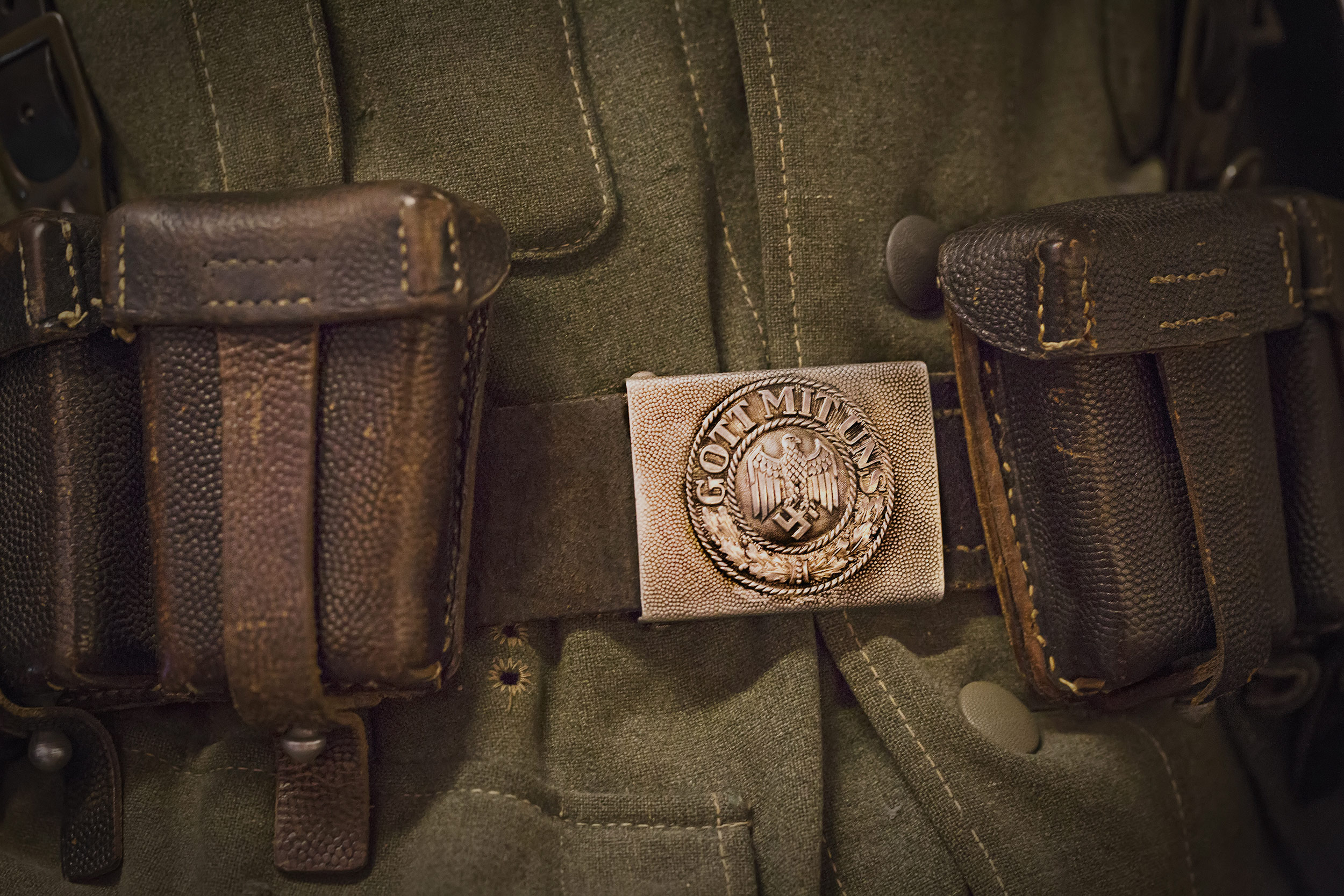When Christians begin to explore the teachings of Jesus related to the prohibition of violence and loving one’s enemy, two questions inevitably come up. Every time.
If it seems that Jesus teaches us to do violence to no person and to love our enemies, the tendency is to immediately jump to the most extreme situations in order to invalidate Him: “What if someone broke into your house and threatened to kill your family?” “What about Hitler?” The teachings of Jesus seem to be too radical, too extreme, too unsafe, too irresponsible, too unrealistic.
Of Nonviolence and Not Killing People
Before we explore those two questions, we first must briefly examine why they are even being asked. Those closest to Jesus and the early Church certainly understood Christ’s prohibition of violence and killing. There is no record of any Christian writer approving of Christian participation in warfare or use of violence until the time of the emperor Constantine, around 300 years after the time of Jesus. The tragic downfall of Christian peacemaking is well documented, read more about it here.
Despite the universal Jewish expectation that the Messiah would be a violent warrior king, Jesus himself lived a life completely free of violence. Moreover, Jesus taught that his disciples should also live a life free of violence, without exception. If an aggressor intends to do you or a loved one harm, the Jesus mandated response is to never respond in kind. Read more about Christ’s teachings and example of nonviolence here.
Jesus doesn’t just call us to operate without violence, he calls us to be pro-active in our love for enemies. The word “love” in the English language can lack meaning, since we apply the word to everything from our spouses to pizza. Jesus commands us to love our enemies the way we are told to love God and more importantly, the way God loves us. Scripture tells us to love, do good things for, bless, feed, give drink to, and pray for our enemy. Shockingly, this includes political and national enemies. Read more about God’s command to love enemies here.
So the short answer, according to Scripture, is to do no harm to either the home invader or Hitler. The long answers are a bit more complicated…

Home Invasion
Every year in the United States 1.13% of homes are invaded, with a member of the household being present at only 0.3% of them. Out of those invasions where someone was home only 0.08% were victims of violent crimes. Overall, 61% of offenders were unarmed when violence occurred. When rape is involved the number of houses becomes even lower at 0.00002%. Only around 100 people (out of 325.7 million) are killed in home invasions every year.1
“What would you do if someone broke into your house and was going to kill your family?”
Those who take the nonviolence teachings of Jesus literally are often faced with this question from skeptics. The skeptic will often also include the threat of rape in this hypothetical situation to raise the stakes in attempt to get them to abandon their logic. Despite there being a near astronomical low chance of this actually happening this becomes the go-to question almost every time.
Several assumptions are made when this question is asked. First, is that there are only two options for how to respond: let my family get raped and killed, or kill the home invader (thus abandoning the proposed ethics of Jesus). The second assumption is that only I have free will: my family being attacked has no decisions they can make and the attacker is only able to do the worst evil they can. The third assumption is that if I were to try to stop the attacker, I would be able to, instead of failing and causing the violence to escalate more than it would have. Fourth it is assumed that the aggressor will actually rape and kill my family instead of it just being a possibility or a threat. The final assumption is that I am morally qualified to be the judge, jury, and executioner and am able to perform all those roles in an instant.
Weighing The Options
First off, the false dilemma of either using lethal force against the invader or standing by and letting the invader rape and kill is wildly illogical. Jesus tells us to not respond to violence with violence, but there are many other ways to stop violence without using violence yourself. Someone who has made up their mind that the way of the sword is the best, most effective, and most responsible option will likely have a gun in their nightstand drawer. The person who has already forbidden themselves the easy route of violence will much more likely seek out a creative way to thwart their would-be home invader.
In various statements recorded in the Gospels, Jesus called his disciples to forsake not only houses and land but even father and mother, spouse and child (Matthew 10:37, 6:33; Luke 14:26). Any consideration of what this means must at least make us question the assumption that the first test of moral responsibility is the readiness to kill in defense of one’s family. The point being, if we want to follow Jesus, truly follow Jesus, then we must be willing to let go of all we hold dear in order to do it.
Theologian John Howard Yoder makes a sobering point when comparing the death of an attacker verses the death of his wife: “Consider the belief that there is such a thing as hell… it would be most likely that my killing the attacker would seal for him that negative destiny. I would take away from him any possibility of repentance and faith. I would be doing this in order to save from death someone who—pardon the piety, but it is a meaningful Christian stance—is ‘ready to meet her Maker.’ To keep out of heaven temporarily someone who wants to go there ultimately anyway, I would consign to hell immediately someone whom I am in the world to save.”
Jesus told his disciples that “those who live by the sword will die by the sword” (Matthew 26:52). Essentially, the violent will perish at the hands of the violent, and this is a most unfitting end for those who are servants of the Prince of Peace. Even if one is successful in killing their attacker it only serves to preemptively make them a murderer rather than the would-be murder. What was once just a possibility of someone dying has become certain and the sin of murder has traded places from the invader to the Christian. Satan will have succeeded in making a follower of Jesus into a killer.

The Way of Jesus
What if you try and fail to kill the attacker? Not only will the victim likely be killed, but so will you, the defender. In their anger the attacker may turn on more people than if they had not been opposed and further enraged. To renounce killing, on the other hand, is the path of trust and faith. It leaves open the possibility for providence or martyrdom. It is not lazy or cowardly; it faces the challenge of creating another way. It is responsible, for it prevents the worst. Most importantly, it is the way of Jesus.
The temptations [of violence] in your life are no different from what others experience. And God is faithful. He will not allow the temptation to be more than you can stand. When you are tempted, he will show you a way out so that you can endure.
1 Corinthians 10:13
Pastor and author Brian Zahnd responds to the question this way, “What do I do? Here’s what I do, I disarm the intruder with the name of Jesus. Then I preach the gospel to the intruder. He is converted. Next Sunday I baptize him. Six months later he is an usher in my church.” His response is perhaps the most imaginative and faithful way to answer such a question. It puts total faith in the Spirit to handle the situation while remaining true to the teachings of Jesus.
Love Thy Burgler
Why afford a home invader the grace of nonviolence? Jesus is the only sensible answer. The way of Jesus is not about the absence of violence so much as it is about the abundance of love in situations where the world would almost never apply it. Love for one’s enemies is what holds violence back from perpetuating evil. In the radical call to love your enemies is the idea that they were never your enemy to begin with. This is why Paul says that our struggle is not against flesh and blood, instead it is against the spiritual evils in the world (Ephesians 6:12).
If Jesus tells us to love our enemies with the same type of love he has for us, then we must be willing to die for the sake of our enemies instead of harming them. This is exactly what Jesus did for us on the cross (Romans 5:10). Think of it this way: If your adult son broke into your house in the middle of the night and threatened to kill your spouse, would you kill your son to stop him? Maybe you would. But you also would likely be wracking your brain for creative nonviolent alternatives to create pacify the situation.
Because Jesus loves the home invader just as much as he loves your family, he doesn’t want the invader to die anymore than he wants your family to die. That is why loving other people is part of what Jesus refers to as “the greatest commandment.” This radical love is what Jesus wants his followers to foster in their hearts. This way, should this hypothetical situation ever be made real, the natural inclination of the Christian is to not respond with violence but rather with the loving example of Jesus. So the answer for the Christian to the question is this: I must seek to deal with the aggressor as God in Christ has dealt with me, with sacrificial love.

The Problem of Hitler
Western culture is absolutely fascinated with Adolf Hitler. Amazon sells over 30,000 books about the man. With spiritual warfare and Satan being too abstract in our post-Enlightenment minds, there seems to be some need to personify evil. In popular culture Hitler is the embodiment of hatred, murder, death, and destruction. But in terms of sheer numbers of innocents intentionally and directly slaughtered, Josef Stalin’s record of murders supersedes Hitler’s.
Stalin ruled the Soviet Union for about thirty years, compared to Hitler’s twelve in Germany. During that time he initiated pogroms and purges, used starvation as a weapon, engaged in antisemitic persecutions, and maintained a constant state of terror for the populations under his control until some tens of millions were left dead. He caused the deaths of many times more innocent people than Hitler. He is undoubtedly the greatest monster of the twentieth century. Nevertheless, Western fascination remains on Hitler as modern history’s ultimate evil. But it wasn’t always this way.
Hitler rose to power in Germany with the near full support of the German people. Even Time Magazine named him “Man of the Year” in 1938. He was loved by virtually everyone. In 1933 when Hitler came to power, the population of Germany was around 60 million. Almost all Germans were Christian, belonging either to the Roman Catholic (ca. 20 million members) or the Protestant (ca. 40 million members) churches. We have to face the facts: most Christians (95%) in Germany welcomed the rise of Nazism.2
The Nazi Church
Hitler and the Third Reich didn’t rise to power despite Christians, it rose to power because of Christians. Historically the German Evangelical Church viewed itself as one of the pillars of German culture and society, with a theologically grounded tradition of loyalty to the state. During the 1920s, a movement emerged within the German Evangelical Church called the Deutsche Christen, or “German Christians.” The “German Christians” embraced many of the nationalistic and racial aspects of Nazi ideology.3 Once the Nazis came to power, this group sought the creation of a national “Reich Church” and supported a “nazified” version of Christianity.
The cross of Christ and the swastika should not and may not oppose each other; they belong together. One must make us look to eternity, and admonish us. Remember that you are a Christian! The other points us toward the present, and admonishes us: Remember that you are a German! The cross of Christ and the swastika — They should and must stand alongside each other!
-The Cross of Christ and the Swastika (a German Christian movement pamphlet)
Like the U.S. motto “In God We Trust”, Nazi uniform belts all stated, “God Is With Us” (Gott Mit Uns). Hitler exceedingly often used the phrase “God is with us” in his speeches to roaring applause.4 In World War II, both the Nazis and the Allies believed that they were fighting on the side of God and that their cause was just. Christians in Germany were very patriotic and believed they should support their troops. Thousands of Nazi graves were marked with John 15:13, “Greater love has no one than this: to lay down one’s life for one’s friends.”
Tragically this tactic of gutting the enemy love teachings of Jesus out of Christianity and replacing it with patriotic nationalism is all too common throughout history. In many regards, what happened to Christianity in Germany echos what has already happened to Christianity in America. What is commonly understood to be Christianity is largely a fusion of Bible-based beliefs and capitalist political ideologies. Where in the early Church being a Christian meant rejecting the culture and way of the worldly nations they lived in, today in America you are often viewed as a bad Christian if you don’t embrace American patriotism.

The Resistance
Many Evangelical Christians in America are for “god and country.” In much the same way, Protestants in Germany found a way to be both believers in Christianity and supporters of Nazism. Ironically, it was Jehovah’s Witnesses who struggled under the new regime. Initially, some leaders of this small religious group (which numbered about 20,000 in Germany in the 1930s) tried to make peace with the Reich. But their faith often prevented them from serving in the army, swearing allegiance to the state, or uttering the words “Heil Hitler,” by this time a common way of saying hello and goodbye.
Hitler was not interested in this unpopular minority, and the Nazis targeted the Jehovah’s Witnesses for persecution. The Nazis destroyed their national headquarters, outlawed their church, and sent many thousands to concentration camps or prisons, where many were killed.5
The beliefs that Jehovah’s Witnesses stayed true to were the peacemaking, nonviolent, Kingdom citizenship teachings of Jesus. It caused them to be persecuted alongside many other people groups. It is most ironic that these Christian ethics could have saved Europe from two world wars if mainline Christians had held to them.
Who Is Responsible For Hitler?
In a very important respect, the question “what would you do about Hitler?” is a dishonest one, or at the very least misleading. It assumes that Christians had no involvement and no responsibility prior to some arbitrary date in the early 1940s. National leaders, like Hitler, are completely powerless without followers. Hitler would have been completely powerless without his Gestapo or his Nazi soldiers. It was Christians who filled 95% of Hitler’s police and military ranks— Christians! Christians who bought into the patriotism, the culture of their country, and the ideologies of their worldly leaders. Christians who abandoned the peace teachings of Jesus for the flag of red, white, and bl[ack/ue]. This is a really tough reality we have to face: World War 2 and the Holocaust happened because of Christians.
The Church should have preached and lived a life of nonviolence and love of enemies for many centuries before the twentieth; the Church should have formed Christians into the kind of people who do not kill Jews, or homosexuals, or gypsies, or communists, or other Christians, or Nazis, or whoever else was victimized by the war. The failure of the church and of Christians to be peacemakers in 1942 is horrible precisely because it is a result and culmination of centuries of failure. Xenophobia, violence, warfare, strife, hatred, and intolerance have been and continue to be acceptable practices for Christians—usually in the name of political identity.
So the question, “what should a Christian have done about Hitler?” is actually a very simple question to answer. No, it isn’t that he should have been assassinated as the questioner assumes is the obvious answer. The obvious answer is that the Christian should have been a Christian: a follower of the way— a follower of Jesus.
Conclusion
The calling for disciples of Jesus with regard to war and violence is in part so distasteful and unnatural to us that it seems that through most of our history, theologians and philosophers have spent much of their time and effort explaining why Jesus could not have meant what he most clearly said. His teachings are only for priests, or, his teachings are for after he returns, or, his teachings are an un-achievable ideal. But no Christian can make an argument to justify war or violence without leaving Jesus and the Gospel out of it.
According to a survey taken in 2008, 77% of U.S. military personnel are Christians. What would happen if 77% of the U.S. military followed Jesus’ message to love one’s enemies instead of killing them? The military-industrial complex would collapse. That’s the definition of radical influence. But the kind of persecution endured by the early Church would not be far behind. Are we ready to suffer for the way of Jesus? Are we willing to refuse to respond to violence with violence? Are we ready to love our enemies, foreign and domestic? Or are we ready for another World War?
Go Deeper
 |
 |
 |
Footnotes
- US Department of Justice Special Report for Victimization During Household Burglary. https://www.bjs.gov/content/pub/ascii/vdhb.txt
- Bergen, Doris. Twisted Cross: The German Christian Movement in the Third Reich. Chapel Hill: University of North Carolina Press, 1996.
- Ericksen, Robert P. Complicity in the Holocaust: Churches and Universities in Nazi Germany. New York: Cambridge University Press, 2012.
- Calic, Edouard, Ed., Secret Conversations With Hitler, The John Day Company
- Phayer, Michael. The Catholic Church and the Holocaust, 1930–1965. Bloomington: Indiana University Press, 2000.